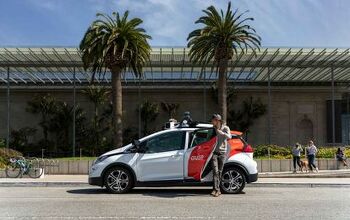Senate Asks Automakers About Forced Labor in China

The Senate Finance Committee has formally requested that eight major automakers provide detailed information about their supply chains in order to determine whether or not they benefit from slave labor. In a letter sent Thursday, the group referenced a report from Sheffield Hallam University claiming that the auto industry is “unwittingly” utilizing metals, batteries, wiring, wheels, and other components that were coming from questionable sources – namely ethnic slaves living in Western China.
Over the summer, new laws came into effect (under the Uyghur Forced Labor Prevention Act) designed to prohibit the importation of any goods tied to forced labor in Xinjiang, China. The region has become a focal point for human rights issues due to how the Chinese Communist Party has treated the Uyghur Muslim population that lives there and the United States now formally recognizes the matter as a genocide.
We’ve seen rolling reports that the population has been corralled into concentration camps and reeducation programs since 2014. Initially, local police launched enhanced surveillance programs to help contend with alleged extremist groups. In some instances, this included installing cameras and listening devices inside of people’s homes. By 2017, leaked drone footage captured images of large groups of people being forced into massive internment camps and Human Rights Watch alleged that China had been unlawfully imprisoning millions of people at “political education centers” based in Xinjiang.
This was also the time when specifics of what was happening to detainees began reaching a larger audience. But the matter we’re concerned with are the accusations that automakers had been benefiting from Chinese slave labor for quite some time. Early claims focused on Volkswagen, BMW, and General Motors – which we’ve covered before. However, subsequent investigations have suggested that the issue is likely so widespread within the automotive sector that every single global manufacturer could be implicated.
The State Department estimates that over one-million Uyghurs and other minorities (cultural, religious, or ethnic) are currently being held at 1,200 state-run internment camps in Xinjiang. Many individuals are likewise assumed to have been forced into labor situations by the government, provided they’ve shown themselves to be extremely compliant at the aforementioned internment centers. The United Auto Workers (UAW) has demanded that automakers move their supply chains out of the industry, with the added benefit of the plan helping U.S. labor.
Finance Committee Chairman Ron Wyden (D-OR) has tapped General Motors, Ford, Tesla, Stellantis, Mercedes-Benz, Honda, Toyota, and Volkswagen AG to submit comprehensive details about their supply chains in Asia in order to determine how much overlap there is with Xinjiang – even if it’s happening via suppliers operating in other countries.
“I recognize automobiles contain numerous parts sourced across the world and are subject to complex supply chains. However, this recognition cannot cause the United States to compromise its fundamental commitment to upholding human rights and U.S. law,” Wyden wrote.
According to The Wall Street Journal, GM has already stated that its policy prohibits any form of forced or involuntary labor, abusive treatment, or corrupt business practices within its supply chain.
“We actively monitor our global supply chain and conduct extensive due diligence, particularly where we identify or are made aware of potential violations of the law, our agreements, or our policies,“ the company told the outlet.
Other automakers seem a little less eager to say anything concrete, not that we’re thinking General Motors has done so much better than the pack. GM, along with BMW and Volkswagen Group, has been the brand seeing the largest number of allegations in the press these last few years. But we’ve also been learning how widespread the problem actually is.
Either way, it’s safe to assume that every automaker will deny any such malfeasance having taken place until the evidence presented against them is insurmountable – at which point they will deny any knowledge of the matter.
Here’s hoping some good comes out of the investigation and Congress moves on to addressing similar human rights abuses tied to cobalt mining. Used in the rechargeable batteries found in EVs, and just about every other modern device, cobalt is primarily sourced by Congolese people living in extreme poverty. We’ve covered child labor issues taking place in relation to battery mining before. But even the adults mining cobalt are in dire straits and typically work in toxic pits – using basic hand tools without any protective equipment – for less than two dollars per day.
Though assuming the Senate Finance Committee conducts a comprehensive investigation, the matter should come up while it looks into global supply chains.
[Image: Katherine Welles/Shutterstock]
Become a TTAC insider. Get the latest news, features, TTAC takes, and everything else that gets to the truth about cars first by subscribing to our newsletter.

A staunch consumer advocate tracking industry trends and regulation. Before joining TTAC, Matt spent a decade working for marketing and research firms based in NYC. Clients included several of the world’s largest automakers, global tire brands, and aftermarket part suppliers. Dissatisfied with the corporate world and resentful of having to wear suits everyday, he pivoted to writing about cars. Since then, that man has become an ardent supporter of the right-to-repair movement, been interviewed on the auto industry by national radio broadcasts, driven more rental cars than anyone ever should, participated in amateur rallying events, and received the requisite minimum training as sanctioned by the SCCA. Handy with a wrench, Matt grew up surrounded by Detroit auto workers and managed to get a pizza delivery job before he was legally eligible. He later found himself driving box trucks through Manhattan, guaranteeing future sympathy for actual truckers. He continues to conduct research pertaining to the automotive sector as an independent contractor and has since moved back to his native Michigan, closer to where the cars are born. A contrarian, Matt claims to prefer understeer — stating that front and all-wheel drive vehicles cater best to his driving style.
More by Matt Posky
Latest Car Reviews
Read moreLatest Product Reviews
Read moreRecent Comments
- Verbal Rented a Malibu a while back. It was fine, if a bit gutless.I get that Detroit wants to go all-in on high profit margin SUVs and blinged-out MAGA trucks. Everyone has known for decades that they can't compete on price in the affordable sedan space. So now all of Detroit's sedans are gone except for a couple of Cadillac models.But you'd think that just one of the domestic brands could produce a fun, competitive and affordable sedan. Just one? Please? Anyone? Bueller?
- 3-On-The-Tree I wouldn’t even use Ford as a hearse for fear of being late to my party.
- SCE to AUX Norway is in Europe, and Tesla is an American automaker - no problems there.I wouldn't use Ford as the bellwether.https://www.reuters.com/business/autos-transportation/tesla-extends-lead-norway-evs-take-record-82-market-share-2024-01-02/https://elbil.no/english/norwegian-ev-policy/
- Steve Biro If the U.S. government wants to talk about banning all connected cars - or at least the collection and sharing of information from said vehicles - I’m all ears. Otherwise, don’t waste my time.
- Ajla Both parties are in favor of banning Chinese vehicles so I don't see how it won't happen in the next year.


































Comments
Join the conversation
"But even the adults mining cobalt..."
We were outraged about the children, but now we have to concern ourselves with the adults too? This feels like a slippery slope.
Can't catch a break huh